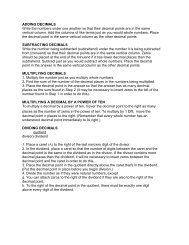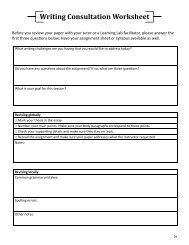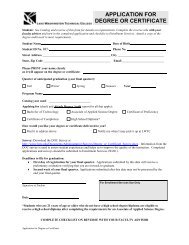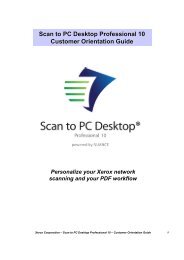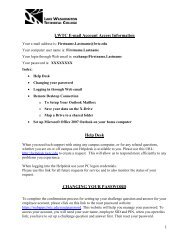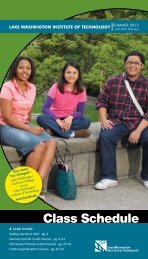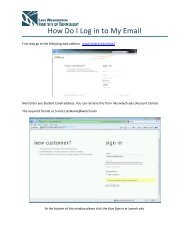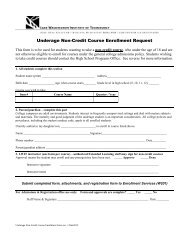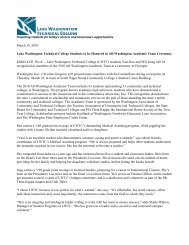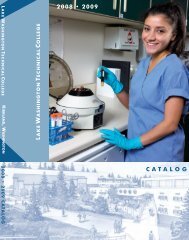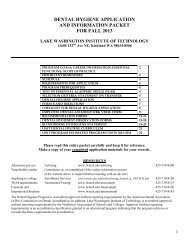2 - Lake Washington Institute of Technology
2 - Lake Washington Institute of Technology
2 - Lake Washington Institute of Technology
You also want an ePaper? Increase the reach of your titles
YUMPU automatically turns print PDFs into web optimized ePapers that Google loves.
Programs <strong>of</strong> Study 2<br />
Social & Human Services<br />
www.lwtech.edu/socialservices<br />
SOCIAL & HUMAN SERVICES<br />
ASSOCIATE IN APPLIED SCIENCE DEGREE<br />
120 CREDITS<br />
Admission Dates: Fall, Winter, Spring, Summer<br />
Program Mission: The Social & Human Services<br />
AAS degree provides the generalist education for<br />
employment in a wide variety <strong>of</strong> social service agencies.<br />
The student will develop the pr<strong>of</strong>essional values, skills,<br />
and knowledge to assist individuals and groups with<br />
personal, interpersonal, and situational problems.<br />
In this occupational area students will be prepared<br />
for employment as case managers in rehabilitation,<br />
employment services, corrections, educational programs,<br />
and community based organizations serving youth, seniors,<br />
and individuals with disabilities.<br />
Social & Human Services AAS degree graduates will:<br />
be prepared for a wide range <strong>of</strong> entry level positions in<br />
the social services field<br />
demonstrate highly effective communication skills<br />
with clients, both verbally and in writing<br />
apply theoretical psychological frameworks to client<br />
thoughts and behaviors<br />
maintain ultimate confidentiality <strong>of</strong> all client information<br />
employ advanced helping skills acquired from two<br />
community internships<br />
gather client information for social history and intake file<br />
facilitate client groups and effectively resolve conflicts<br />
interact with clients and coworkers with cultural<br />
mindfulness<br />
remain current with a variety <strong>of</strong> documentation<br />
processes and s<strong>of</strong>tware<br />
assist clients in developing alternative strategies and<br />
informed choices for solving interpersonal problems<br />
guide clients to become aware <strong>of</strong> underlying issues<br />
impacting their behavior<br />
encourage client development <strong>of</strong> self-advocacy skills<br />
and techniques<br />
identify crises, diffuse immediate situation while<br />
following the protocol for referral and reporting<br />
Interview, assess, and appropriately refer clients to<br />
community resources<br />
demonstrate critical thinking, teamwork,<br />
communication, intercultural appreciation, and<br />
technical and information literacy skills<br />
collaborate with clients and other service providers<br />
according to the pr<strong>of</strong>essional code <strong>of</strong> ethics<br />
meet Social Science, Humanities, Written<br />
Communication, and Quantitative Reasoning<br />
distribution area outcomes<br />
<strong>Lake</strong> <strong>Washington</strong> <strong>Institute</strong> <strong>of</strong> <strong>Technology</strong> does not <strong>of</strong>fer<br />
every course each quarter. It is the student’s responsibility<br />
to consult the Class Schedule and work out an individual<br />
schedule with an adviser or counselor. Any developmental<br />
coursework a student may be required to complete may<br />
increase the program length.<br />
PROGRAM REQUIREMENTS<br />
PSYC 099 Human Relations. ..............................5<br />
PSYC& 100 General Psychology ............................5<br />
PSYC& 200 Lifespan Psychology. ...........................5<br />
PSYC& 220 Abnormal Psychology. .........................5<br />
SHSV 110 Intro to Social & Human Services. ...............5<br />
SHSV 120 Case Management & Systems. ..................5<br />
SHSV 130 Therapeutic Approaches & Techniques. ..........5<br />
SHSV 136 Issues in Aging: Boomers & Beyond. .............5<br />
SHSV 138 Field Practicum I ...............................5<br />
SHSV 140 Disability Issues & Practice. .....................5<br />
SHSV 142 Behavioral Health & Wellness ...................5<br />
SHSV 146 Leadership Development & Ethics. ..............5<br />
SHSV 210 Group Process & Dynamics. .....................5<br />
SHSV 212 Intro to Chemical Dependency. .................5<br />
SHSV 218 Field Practicum II. ..............................5<br />
SHSV 220 Advanced Therapeutic Techniques ..............5<br />
SHSV 222 Multicultural Counseling. .......................5<br />
SHSV 238 Field Practicum III. .............................5<br />
SOC& 101 Intro to Sociology. .............................5<br />
ELECTIVES – 10 CREDITS<br />
Up to 10 additional credits <strong>of</strong> which all must be in college-level<br />
courses as defined by the technical institute or as accepted as fully<br />
transferable as defined by the state system.<br />
ACADEMIC CORE REQUIREMENTS – 20 CREDITS<br />
Social Science (included in required courses). ....5<br />
Written Communication. .......................5<br />
Quantitative Reasoning. ........................5<br />
Humanities. ...................................5<br />
TOTAL PROGRAM CREDITS .......................... 120<br />
See page 15 for a list <strong>of</strong> all applicable courses for each <strong>of</strong> the<br />
categories listed above.<br />
2 0 1 3 - 2 0 1 4 • L A K E W A S H I N G T O N I N S T I T U T E O F T E C H N O L O G Y • C A T A L O G 131<br />
Programs <strong>of</strong> Study



